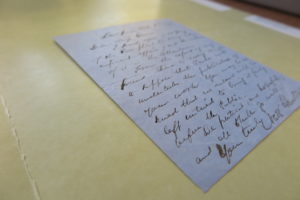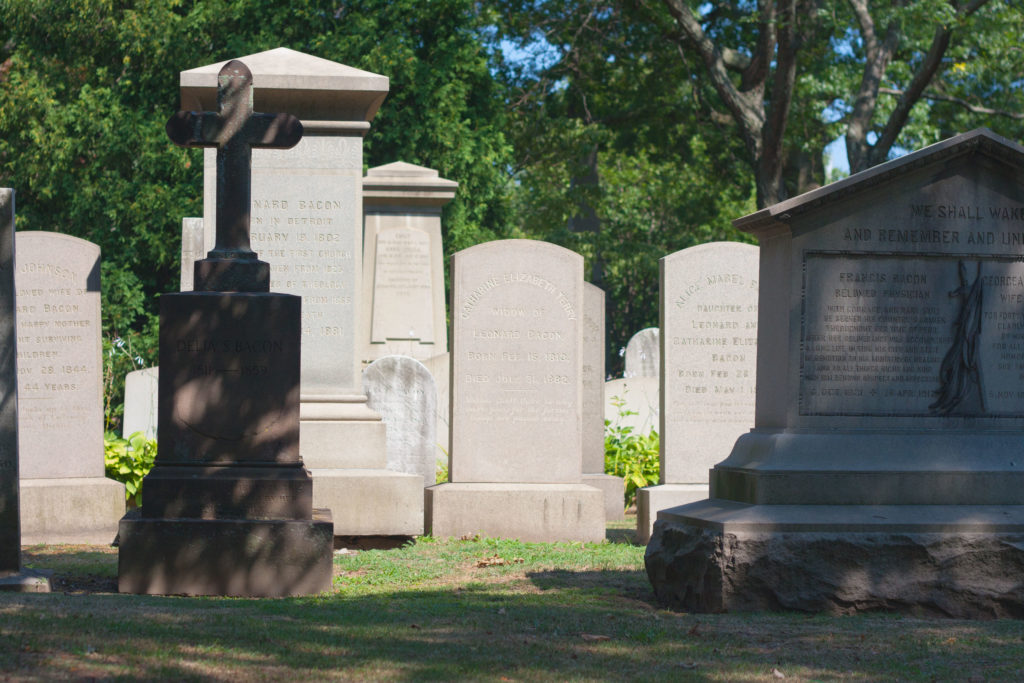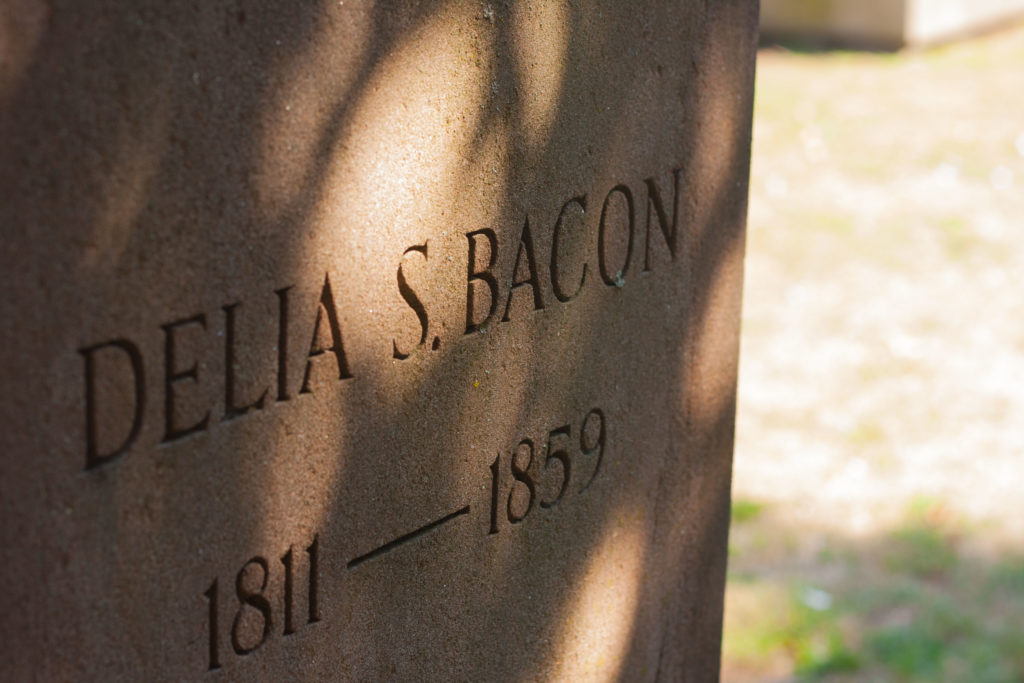Have a drink with: Delia Bacon
“…very wise in the doctrine of consequences.”
Ask her about: fair and balanced journalism
Once upon a time, two crazies went head-to-head in a public challenge. It was a deeply partisan fight marked by high emotions and questionable discretion, and in the end the loudmouthed, cowardly male nut job won in a maddeningly close vote by going after his intelligent but awkward female opponent with sexism and misdirection.
This was 1847, by the way. Have we learned nothing?
Delia Bacon’s father wanted to build utopia in Ohio. He died, frustrated and broke, when Delia was six, and she was sent to live with family friends in Connecticut. Delia didn’t have it easy, but didn’t back down: she gained fame and independence through her writing and teaching, eventually running a history salon of sorts for well-to-do ladies – and this despite being on her own from fifteen years old, failing at setting up a school, and getting malaria.
In 1846, Delia Bacon meets Yale divinity student Alexander McWhorter. She is aloof but charmed; he admires her fiery intellect and local celebrity. She’s 35, he 23. She invites him to meet her in the parlor at her New Haven hotel, where she teaches and entertains, and he continues to call on her – going so far as to chase her to Northampton, Massachusetts while she’s indulging in the “water cure,” a 19th-century health fad involving literal wet blankets. His persistence wins the day.
Delia’s old teacher and water-cure buddy Catherine Beecher, who has the tact of a summer squash, wonders aloud if this is just a “Platonic flirtation,” and giddy Delia basically tells her, hey, you can call it whatever you want. Catherine, convinced she’s doing Delia’s reputation a favor, starts spreading the word that the pair are engaged. Once Alexander hears this he retreats in a noisy panic – insulting Delia as a liar and an aging seductress, passing her love letters around to his friends, and claiming she had begged him to marry her (in fact, he’d been the one to propose, and she rejected him).
Delia’s brother Leonard, a prominent minister, urges his colleagues to revoke MacWhorter’s license to preach on defamation grounds. In a trial conducted by the New Haven West Association of ministers (“trial” is a generous term, it being an unregulated festival of hearsay evidence), weak justifications emerge: though McWhorter no doubt exercised “lack of prudence and sound Christian discretion,” and while the panel agreed that one could certainly see the Bacons’ point, ultimately no charge was “sufficiently sustained” – and let’s not wreck the poor boy’s career, he has such potential. (Sound familiar?) Besides, what sort of woman asks a man to her hotel, anyway? McWhorter is acquitted by a vote of 12-11.
Delia was never quite the same. Humiliated, she threw herself into her work and spent the rest of her life in dramatically delicate ill health, working maniacally on a book dedicated to the idea that Francis Bacon (no relation) wrote the plays attributed to William Shakespeare, with the possible help of a wealthy, learned syndicate.
(She also briefly entertained the idea of digging up Shakespeare’s corpse with a trowel.)
Delia Bacon died in her late forties in an insane asylum in Hartford, Connecticut, remembered as a “sex-starved spinster”* who wrote an unreadable doorstop of a book – never mind that she turned out to have anticipated a larger movement questioning Shakespeare’s authorship, nor that her douche of a boyfriend is known for swearing up and down that the ancient Phoenicians took their vacations in upstate New York.
That isn’t even the point. The social price of female innovation has always been ridiculously high, and I wish I could say it’s surprising that Delia Bacon had to justify herself against accusations that she was low-born, crazy, a liar or a slut before she could even try to put her work on the table.
But it isn’t. It wasn’t then, and it isn’t now, as much as that fact makes me want to put my foot through a wall.
In a don’t-miss humor piece on Hillary Clinton’s speech at the Democratic convention, Alexandra Petri imagines the candidate’s inner monologue, musing:
“I sometimes wonder what life would be like if I were male and people only disliked me for my personality, instead of for my personality and my gender. Think of everything I could have accomplished! Ha, ha, ha, *natural laugh* (Blood vessel bursts in eye.)”
Delia could hardly have said it better.
Fun Facts:
Delia was a devotee of the “water cure,” or hydropathy, a 19th century brand of quackery that proclaimed cold water – ice baths, wet sheet wrappings, bottomless glasses of cold water, and full-on dousings – the cure for all ills. Think of it as a spa where you eat soggy Triscuits while standing in front of a fire hydrant.
Catherine Beecher eventually wrote a book to clear Delia’s name, the pitch for which went something like:
Catherine: I can help!
Delia: Please don’t.
Catherine: But I wrote a book, see?
Delia: You’ve done quite enough already. Can we not just go sit in front of a cold fire hose together like the old days?
Convinced her grand gesture would exonerate Delia and distract folks from her own role in the affair, Beecher proceeded over her friend’s objections. Readers weren’t interested in what most people felt was small-town gossip, and the book was awful, with reviews claiming it “adds a new motive to the constant exercise of the feeling which prays or deliverance from one’s friends!”**
And while Delia was mentally unstable, her beau was tinfoil-hat material. In the late 1860’s, the hottest ticket around was the Cardiff Giant, a stone colossus dug up near Syracuse and touted as an ancient being. MacWhorter said the statue was an honest-to-goodness Phoenician god (in response to which the Giant’s backers dutifully and secretly carved “Phoenician” astral markings on it to sell more tickets).
The likes of Hawthorne, Emerson and Twain knew of and supported Delia Bacon and her research – Hawthorne even provided financial backing to publish her work, but for the sake of his own image publicly dismissed it. Writing to Bacon on October 6, 1856, Hawthorne noted: “Be patient, and hopeful, and all shall go well.”

Additional Reading:
On shaming and female achievement: Peggy Orenstein, Girls & Sex: Navigating the Complicated New Landscape
* Irving Wallace, The Nympho & Other Maniacs
Catherine Beecher, Truth Stranger Than Fiction: A narrative of recent transactions, involving inquiries in regard to the principles of honor, truth, and justice, which obtain in a distinguished American university
** Vivian Hopkins, Prodigal Puritan: A Life of Delia Bacon
The Friends of the Grove Street Cemetery held an event in 2002 in honor of the 200th anniversary of Leonard Bacon’s birth, the program for which has a great essay on Delia by Yale’s brilliant archivist Judith Ann Schiff.
Delia Salter Bacon, The Philosophy of the Plays of Shakspeare Unfolded

